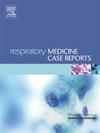A novel cystic fibrosis mutation “delS1255” in a male diagnosed at birth
IF 0.7
Q4 RESPIRATORY SYSTEM
引用次数: 0
Abstract
Cystic fibrosis (CF) is an autosomal recessive disorder caused by pathogenic variants in the CFTR gene. Over 2000 CFTR variants have been identified, and ongoing genetic characterization remains critical for guiding eligibility for CFTR modulator therapies and contributing to variant databases that support diagnosis and research. We describe a 20-year-old Caucasian male who is a compound heterozygous for the common F508del mutation and a novel variant, p.Ser1255del (c.3763_3765delTCA; delS1255). He was diagnosed with CF in the neonatal period following meconium ileus, confirmed by elevated sweat chloride testing. His clinical course included pancreatic insufficiency, chronic Staphylococcus aureus colonization, and sinus disease with nasal polyps, but no evidence of CF-related diabetes or liver disease. Molecular diagnostic testing conducted at Stanford Clinical Laboratory using PCR and bidirectional Sanger sequencing confirmed the F508del mutation and identified the previously unreported delS1255 variant, an in-frame deletion of a serine residue at position 1255. This variant is absent from population databases and a missense mutation at the same codon has previously been associated with severe CF phenotypes, supporting its likely pathogenicity. The patient was initiated on elexacaftor-tezacaftor-ivacaftor (ETI) therapy in 2021, based on the presence of the F508del allele. Since starting ETI, he has experienced substantial clinical improvement, including improved spirometry, radiology, and a marked reduction in sweat chloride concentration. The response is presumed to be driven by the F508del variant, while the effect of delS1255 on modulator responsiveness remains unknown. This case adds to the growing spectrum of CFTR variants with clinical relevance.
一名男性在出生时诊断出一种新的囊性纤维化突变“delS1255”
囊性纤维化(CF)是一种常染色体隐性遗传病,由CFTR基因的致病变异引起。目前已鉴定出超过2000种CFTR变异,正在进行的遗传表征对于指导CFTR调节剂治疗的资格以及为支持诊断和研究的变异数据库做出贡献仍然至关重要。我们描述了一名20岁的高加索男性,他是一种常见的F508del突变和一种新的变异p.Ser1255del (c.3763_3765delTCA; delS1255)的复合杂合。他被诊断为CF在新生儿期胎粪肠梗阻后,通过升高汗液氯化物测试证实。他的临床过程包括胰腺功能不全,慢性金黄色葡萄球菌定植,鼻窦疾病伴鼻息肉,但没有cf相关糖尿病或肝脏疾病的证据。斯坦福临床实验室使用PCR和双向Sanger测序进行的分子诊断测试证实了F508del突变,并鉴定了以前未报道的delS1255变体,即1255位置丝氨酸残基的帧内缺失。该变体在种群数据库中不存在,并且同一密码子的错义突变先前与严重的CF表型相关,支持其可能的致病性。基于F508del等位基因的存在,该患者于2021年开始接受elexactor - tezactor -ivacaftor (ETI)治疗。自从开始ETI治疗以来,他的临床有了很大的改善,包括肺活量、放射学的改善,汗液氯化物浓度的显著降低。该响应被认为是由F508del变体驱动的,而delS1255对调制器响应性的影响仍然未知。该病例增加了具有临床相关性的CFTR变异谱。
本文章由计算机程序翻译,如有差异,请以英文原文为准。
求助全文
约1分钟内获得全文
求助全文
来源期刊

Respiratory Medicine Case Reports
RESPIRATORY SYSTEM-
CiteScore
2.10
自引率
0.00%
发文量
213
审稿时长
87 days
 求助内容:
求助内容: 应助结果提醒方式:
应助结果提醒方式:


